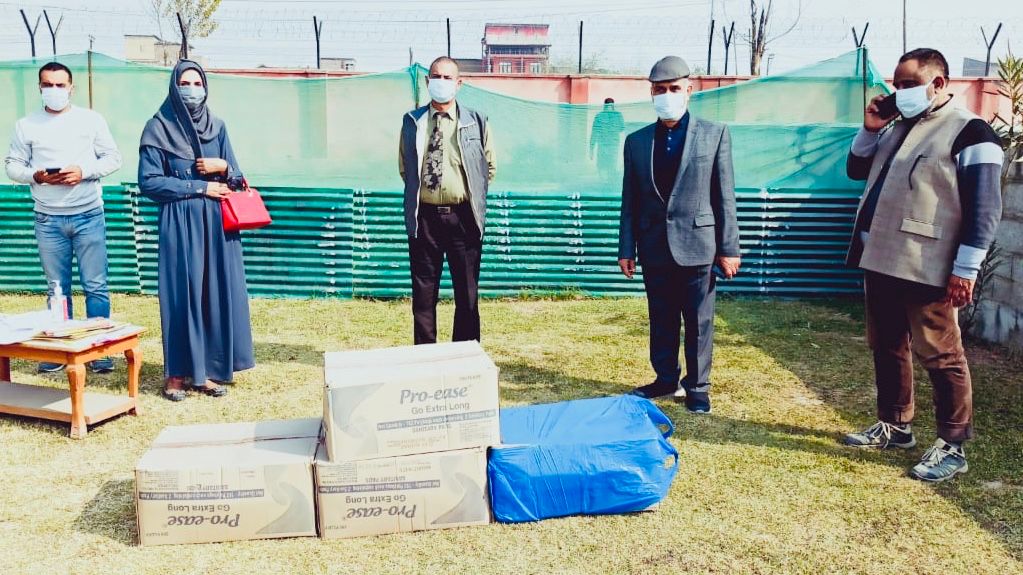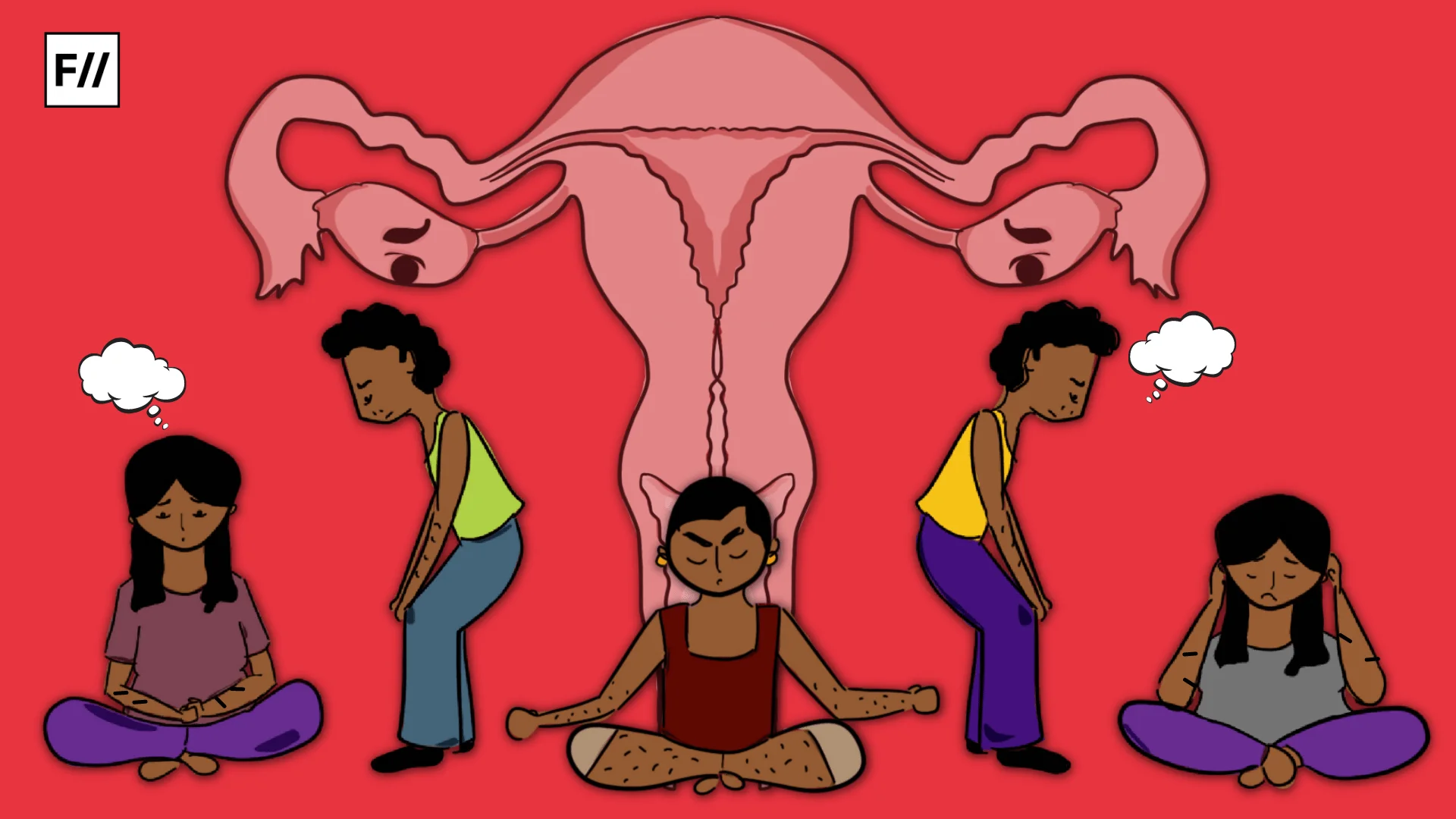Irfana Zargar, a Srinagar resident, fills empty wooden wicker baskets placed in the corners of a shelf inside women’s washrooms in the Lal Chowk area of Srinagar with sanitary napkins.
“These pads can be used in case of an emergency. I took this initiative back in 2014 after sensing the need of many women,” Zargar told FII. “The other purpose of keeping sanitary pads available inside public toilets is to promote its use to improve menstrual hygiene,” she added.
Born in the Nowshera area of old Srinagar, popularly known as Downtown, Zargar spends around INR 5000 from her salary after every three months to buy a stock of pads.

“Women can use them in 17 different locations in Srinagar city,” she said. “I wish I could make pads available for women in the entire Kashmir but my salary is too low,” Zargar said adding that she works for Srinagar Municipal Corporation (SMC) on a consolidated basis.
Zargar told FII that a large number of women in Kashmir still use dirty cloth during their periods as a result many women in the region suffer from different diseases including urinary tract infections.
Jammu and Kashmir, according to the latest National Family Health Survey (NFHS) report released in May 2022, claims that the Union Territory ranks lowest in menstrual protection and hygiene in north India as 60% of women still use dirty cloth or rags for menstrual protection during periods. The report added that 51% of the women in the Kashmir region go through insufferable cramps out of which 10% have erratic periods.
The practice of using dirty cloth or rags instead of pads, Zargar said, is mostly found among underprivileged women living in remote regions of the Valley.
Also Read: Choosing Polite Menstruation Over Organised Menstruation: How Social Conditioning Makes Us Behave
“Many of the women who don’t know what sanitary napkins are complained to have developed a vaginal infection when I spoke to them during my awareness campaign during which I distributed pads to hundreds of underprivileged women.”
Zargar claimed that the use of dirty cloth is not confined to only remote regions of Kashmir as hundreds of women use it in cities too.
“My family members including me used rags during menstruation because I belonged to a lower-middle class family,” she said, adding that many people cannot afford to purchase pads regularly just like her when she was a teenager because of financial issues.
Desperate times call for desperate measures
Sabreen Bhat, a student, recalls the day her periods started suddenly while heading towards her college. For the fear of getting stained and gaining unwanted attention from the public, she rushed towards a women’s washroom so that she could borrow a couple of sanitary napkins from someone.
“I was wearing a white uniform when I realised my menstrual cycle started. I turned pale because I was not carrying pads with me. I rushed inside a washroom but no one was there and all of a sudden I found a basket full of pads,” Bhat told FII. “It was a narrow escape,” she said, adding the person who had placed them inside the washroom saved her from embarrassment and shame.
Young girls, Bhat said, feel shy while buying pads from the marketplace since male shopkeepers pass on these packets in black bags or newspaper rolls in such a way as if selling pads is illegal or scandalous.
“I have never purchased pads for myself. I tell my mother to get them for me whenever I need them because of the mindset of the people and lack of knowledge about women’s hygiene,” she said. “There are thousands of girls like me and I understand their feelings because we come from a conservative place where menstruation is still not discussed openly,” Bhat added.
Also Read: Sustainable Menstruation: Is The Burden On Individual Menstruators Alone?
In 2020, Covid-19 wretched havoc across the globe, as a result, life came to stand still but Zargar continued to reach out to the women living in far-flung areas of Kashmir valley with her awareness drive under the banner ‘Eva Safety Door’ which means “opening of a door towards the safety of the women.”
The determination to further her awareness programme among women made many noted personalities such as Bollywood actress, Raveena Tandon, and Minister of Women and Child Development, Smriti Irani, commend Zargar when her images of delivering sanitary pads to underprivileged women living in far-flung areas of Kashmir during the peak of Covid-19 went viral on social media.
Taking to the micro-blogging site Twitter the Bollywood star wished to offer financial support from her foundation Rudra to Zargar and tagged the Mayor of Srinagar city, Junaid Azim Mattu, saying to check “if she [Zargar] can be forwarded some help.” The mayor responded quickly saying “have asked my office to call her for a meeting. We will extend all possible support to her and ensure her efforts are encouraged.” However, nothing concrete happened so far.
Sania Syed (name changed) , a counselling psychologist from Srinagar, while appreciating Zargar for her initiative said that these steps should have been taken by the government rather.
“Representatives of a responsible society care about the well-being of their women but I don’t find it in Kashmir,” Syed told FII. “Female representatives of J&K Government should have proposed the idea of ensuring the availability of free pads in public washrooms, schools, colleges and universities. I salute Irfana [Zargar] who is doing it on her own by saving a healthy portion of her meagre salary for our benefit,” she added.
Syed said that any Non-Government Organization [NGO] or big brands that manufacture sanitary pads should come forward and support Zargar in her cause.
FII reached out to Srinagar Municipal Corporation Commissioner, Atthar Amir, “Government can help Zargar if she approaches them,” he said.
“She is doing good work and the Government surely will help her.“
Hopes of saving women from unhealthy menstrual hygiene
Zargar aims to end the culture of using dirty cloths or rags during the menstrual cycle in Kashmir. She said that her dream is to come up with her own sanitary pad brand so that women living in remote areas, as well as cities, can afford it.
“Many are aware of sanitary napkins but they cannot afford them due to high cost. I am planning to bring my own product into the market so that women can purchase without facing the heat of the price,” Zargar said. “I need the financial support from society,” she said adding that she expects women from Kashmir or other parts of India to help her in generating capital for her initiative.“

Source: Saba Khan
“There is still a section or a class in our society who cannot even afford the pads I will manufacture and I as a responsible woman will visit their home and deliver them sanitary napkins free of cost.”
Setting up her own product
Zargar aims to end the tradition of using cloth during the menstruation cycle in Kashmir and desires to set up her own sanitary napkin brand so that women belonging to lower strata of society can afford it.
“Many women are aware of the use of sanitary napkins but they cannot afford them regularly. I desire to bring my own product into the market so that women can purchase quality pads without facing the heat of the price,” Zargar told FII.
“Earning money has never been my priority but I dream of making our women healthy in the context of menstrual hygiene,” Zargar said, adding that the red dot is a gift from God to women in order to carry on the human race. “One has to show respect to the red dot and talking about it should not be considered taboo. People need to understand that something that provides greenery to families,” she concluded.





My wife’s mother ruined my marriage. Hope to see something on mothers in law soon.